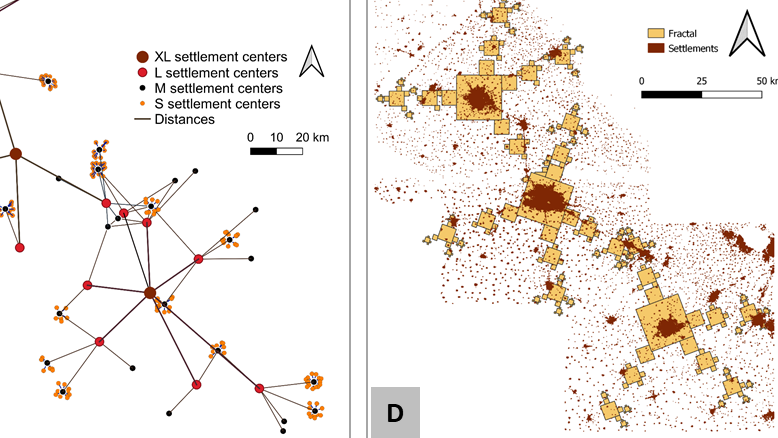This page contains automatically translated content.
Verstädterung von Landschaften führt zu fraktalen Mustern

Dabei bringen sie - ähnlich selbstorganisierenden Systemen in der Natur - häufig fraktale Muster hervor. Fraktale folgen einem Wachstum, indem sie kleinere Kopien von sich selbst produzieren, also ähnliche Muster mit fast gleichen Strukturen hervorbringen. Im Mittelpunkt der Untersuchung steht das Siedlungssystem des Bundesstaates Punjab in Nordindien.
Dr. Thanh Thi Nguyen, Dr. Ellen Hofmann und Prof. Dr. Andreas Bürkert verdeutlichen in ihrer Studie, dass fraktale Formen eine naturbasierte Alternative zu etablierten Planungsparadigmen darstellen könnten. Mit dem Ziel Grundlagenwissen zu gewinnen, hat das Forschungsteam verschiedene Forschungsansätze kombiniert. Ihre Ergebnisse könnten dazu beitragen, das Bewusstsein von Planern und Entscheidungsträgern für systemimmanente Eigenschaften und Organisationsprinzipien in der Stadt- und Regionalentwicklung zu schärfen und somit „zu nachhaltigeren ländlich-urbanen Transformationen führen,“ schlussfolgern sie.
Unter dem Titel „Spatial patterns of urbanising landscapes in the North Indian Punjab show features predicted by fractal theory" ist der Beitrag auf dem renommierten britischen Wissenschaftsportal Scientific Reports (Nature Gruppe) erschienen und frei zugänglich.
LINK: https://www.nature.com/articles/s41598-022-05906-4
Kontakt:
Dr. Ellen Hoffmann
FB 11 Ökologische Agrarwissenschaften,
Fachgebiet Ökologischer Pflanzenbau und Agrarökosystemforschung in den Tropen und Subtropen
Tel.: 05542 - 98 12 51
E-Mail: ellen.hoffmann[at]uni-kassel[dot]de